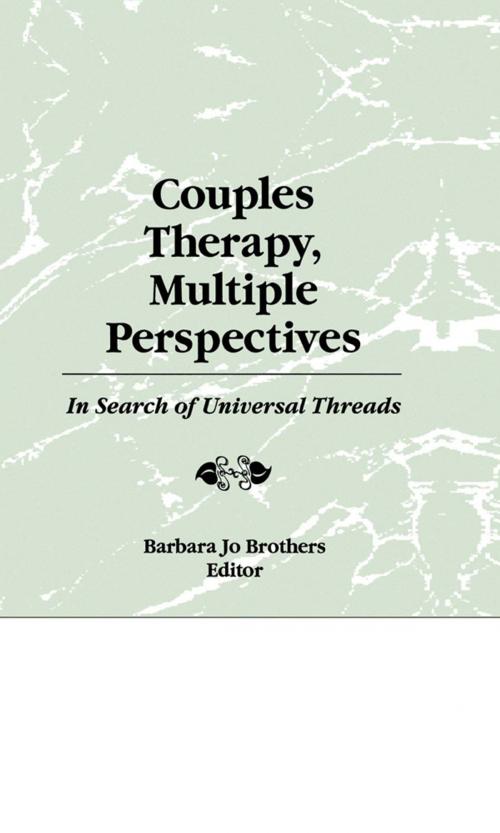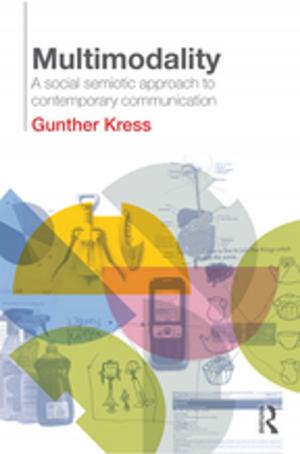Couples Therapy, Multiple Perspectives
In Search of Universal Threads
Nonfiction, Health & Well Being, Psychology, Mental Health| Author: | Barbara Jo Brothers | ISBN: | 9781317765042 |
| Publisher: | Taylor and Francis | Publication: | January 14, 2014 |
| Imprint: | Routledge | Language: | English |
| Author: | Barbara Jo Brothers |
| ISBN: | 9781317765042 |
| Publisher: | Taylor and Francis |
| Publication: | January 14, 2014 |
| Imprint: | Routledge |
| Language: | English |
Couples Therapy, Multiple Perspectives is a springboard from which therapists may begin to answer such questions as What are the ingredients essential to good relationships? What are the ingredients essential to activity within the psychotherapeutic relationship? How can what therapists know regarding psychotherapy be combined to create a whole greater than the sum of its parts? Barbara Jo Brothers aids therapists in answering these and other questions about the basic ingredients, the common denominators, and the universal threads of work with couples from exploring the theories and methods of successful therapists.
As there are many ways of looking at couples therapy, this volume encourages therapists to work cooperatively, not competitively, in developing clients’possibilities. Couples Therapy, Multiple Perspectives is intended to assist therapists working with couples achieve a broader view of their work and a richer range of choices in helping their clients. Every article, especially the two by master therapists Florence Kaslow and Maurizio Andolfi, moves readers toward a tapestry of therapeutic possibilities.
Features of Couples Therapy, Multiple Perspectives include an in-depth look at the ingredients of a successful marriage, or, what makes marriages work for the long-term by Florence Kaslow; an article by Maurizio Andolfi, translated by Vincenzo DiNicola, which brings together an excellent integration of theories, including those of Bowen, Framo, and Whitaker. Andolfi describes a transgenerational approach to work with couples in crisis, with a case example of the value of doing family-of-origin work in the initial phase of therapy. In an interview segment with Virginia Satir (with Sheldon Starr, PhD, in 1985), she explores how all good therapy has essentially the same ingredients. Readers will find Satir's ideas timeless and thought provoking; indeed they may re-evaluate their own position and theories on therapy with couples.
Couples Therapy, Multiple Perspectives is a springboard from which therapists may begin to answer such questions as What are the ingredients essential to good relationships? What are the ingredients essential to activity within the psychotherapeutic relationship? How can what therapists know regarding psychotherapy be combined to create a whole greater than the sum of its parts? Barbara Jo Brothers aids therapists in answering these and other questions about the basic ingredients, the common denominators, and the universal threads of work with couples from exploring the theories and methods of successful therapists.
As there are many ways of looking at couples therapy, this volume encourages therapists to work cooperatively, not competitively, in developing clients’possibilities. Couples Therapy, Multiple Perspectives is intended to assist therapists working with couples achieve a broader view of their work and a richer range of choices in helping their clients. Every article, especially the two by master therapists Florence Kaslow and Maurizio Andolfi, moves readers toward a tapestry of therapeutic possibilities.
Features of Couples Therapy, Multiple Perspectives include an in-depth look at the ingredients of a successful marriage, or, what makes marriages work for the long-term by Florence Kaslow; an article by Maurizio Andolfi, translated by Vincenzo DiNicola, which brings together an excellent integration of theories, including those of Bowen, Framo, and Whitaker. Andolfi describes a transgenerational approach to work with couples in crisis, with a case example of the value of doing family-of-origin work in the initial phase of therapy. In an interview segment with Virginia Satir (with Sheldon Starr, PhD, in 1985), she explores how all good therapy has essentially the same ingredients. Readers will find Satir's ideas timeless and thought provoking; indeed they may re-evaluate their own position and theories on therapy with couples.















